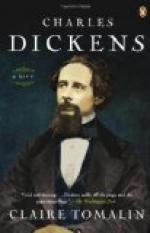Yet not at the time a successful book. Why Fortune, the fickle jade, should have taken it into her freakish head to frown, or half frown, on Dickens at this particular juncture, who shall tell? He was wooing her with his very best work, and she turned from him. The sale of “Pickwick” and “Nicholas Nickleby” had been from forty to fifty thousand copies of each part; the sale of Master Humphrey’s Clock had risen still higher; the sale of even the most popular parts of “Martin Chuzzlewit” fell to twenty-three thousand. This was, as may be supposed, a grievous disappointment. Dickens’ personal expenditure had not perhaps been lavish in view of what he thought he could calculate on earning; but it had been freely based on that calculation. Demands, too, were being made upon his purse by relations,—probably by his father, and certainly by his brother Frederic, which were frequent, embarrassing, and made in a way which one may call worse than indelicate. Any permanent loss of popularity would have meant serious money entanglements. With his father’s career in full view, such a prospect must have been anything but pleasant. He cast about what he should do, and determined to leave England for a space, live more economically on the Continent, and gather materials in Italy or Switzerland for a new travel book. But before carrying out this project, he would woo fortune once again, and in a different form. During the months of October and November, 1843, in the intervals of “Chuzzlewit,” he wrote a short story that has taken its place, by almost universal consent, among his masterpieces, nay, among the masterpieces of English literature: “The Christmas Carol.”
All Dickens’ great gifts seem reflected, sharp and distinct, in this little book, as in a convex mirror. His humour, his best pathos, which is not that of grandiloquence, but of simplicity, his bright poetic fancy, his kindliness, all here find a place. It is great painting in miniature, genius in its quintessence, a gem of perfect water. We may apply to it any simile that implies excellence




